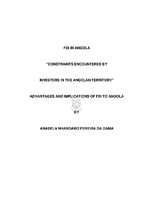FDI in Angola constraints encountered by investors in the Angolan territory
Abstract
This thesis focuses on Foreign Direct Investment (FDI) in Angola and on constraints encountered by investors. It discusses the new Investment Law, resulting from a
comprehensive law reform in 2003, as well as investment incentives destined to attract FDI into the territory, furthermore: the legal definitions of FDI and of “Investor”; the Angolan private international law; the main constraints (investment barriers) encountered by investors, after and before entering the Angolan territory; the legal protection afforded to investors, and some examples of FDI and their implications in Angola. The author also analyses investment and intra-trade within the Sub-Saharan region, Angola
under modes 3 and 4 of GATS, and other aspects of foreign (as well as private) investment, including on what has been done and what should still be achieved under the SADC Trade, Finance and Investment Protocol from 2005 onwards. This analysis, it is hoped, will contribute to the better understanding of the implications and benefits of FDI in Angola, considering the recent increase of inflows of FDI, as well, as to what extent and how the Government should continue to control and direct, as well as encourage FDI.
To conclude, the impact (positive -negative) of FDI in the Angolan society, economy and for the environment will be discussed. Together with the chapters describing the legal
framework for FDI, these parts are intended to provide a better insight into the legal, economic and social background for investing and for doing business in Angola, and what type of protection investors can expect from the country, whilst information and academic materials on this subject matter continue to be scarce and difficult to access.

